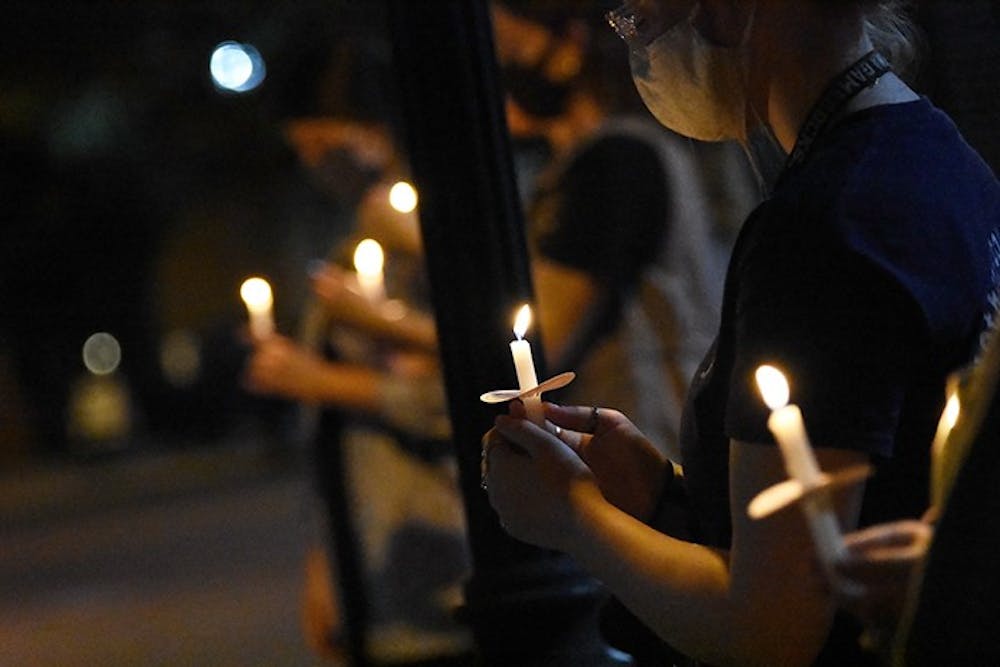In honor of Supreme Court Justice Ruth Bader Ginsburg, students gathered for a candlelight memorial service on Greene St. Friday night. Speakers included USC alumna Lyric Swinton and candidate for South Carolina’s 2nd Congressional District Adair Boroughs.
After Ginsburg’s death last Friday, members of different organizations, including the USC Hillel Foundation, ACLU USC and Generation Action worked together to host the memorial service and honor the justice's life.
Lacie Greenspan, a second-year political science student and executive member of the USC Hillel Foundation, started the service with a prayer.
Greenspan was inspired by Ginsburg for representing not only women on the Supreme Court, she said, but Jewish women, too. To Greenspan, it was important that the memorial honored Ginsburg’s Jewish religion, so it was held on the last day of Shiva, a week-long mourning period.
“It is important that we recognize her as a woman on the Supreme Court, but first, she was a Jewish woman, and that is a huge part of her identity,” Greenspan said.
Swinton said in her speech she looked up to Ginsburg for breaking boundaries for people of all genders, races and classes.
“I know first-hand what it's like to be over-qualified, yet still be discriminated against in some spaces due to my race, gender or socioeconomic status. Justice Ginsburg experienced a bit of that in her life, as well,” Swinton said.
Ginsburg was one of nine women in her class of 500 at Harvard Law and the first tenured female professor at Columbia University.
“We, as women, are able to ascend higher than ever thought possible because Justice Ginsburg endured the cuts and scars from breaking glass ceilings so we didn’t have to,” Swinton said.
As a woman running for a congressional seat in South Carolina, Boroughs said in her speech she was only able to do so thanks to the influence of Justice Ginsburg.
"When I graduated from law school, I had multiple offers. There was no longer that compunction that you absolutely cannot hire a woman. She argued cases before the Supreme Court that are still vitally important to us," Boroughs said.
Boroughs shared the story of Vickie Eslinger, a woman who was denied a South Carolina Senate page position because of her gender. Eslinger was represented in Eslinger v. Thomas by Jean Toal, one of the first female judges in South Carolina, who had consulted with Ruth Bader Ginsburg, a law professor at the time. Eslinger won the case, allowing for women to be Senate pages in South Carolina.
"She took time to remind us that we need not be experts and talented in every field. But we all have some skill, we all have some talent, and we should use that skill and that talent to do our work to the best of our ability," Boroughs said.
Blake Gibbons, a second-year geography and political science student, said attending the memorial service was an opportunity he could not pass up because of all the progress Ginsburg made for the country.
"Making sure that her life is honored is just something that I wouldn't want to miss out on," Gibbons said.
Nathan Birch, a first-year international business student, said he could honor her legacy by attending the service.
“She has paved the way for women's rights, LGBTQ rights and we just really need to honor her,” Birch said.
He said Ginsburg continued to defy odds even after death, as she was "the first woman and the first Jewish person to lie in state at the U.S. Capitol."
“As you can see, she's continuing to breaking boundaries,” Birch said.

